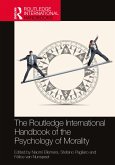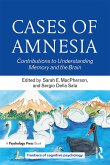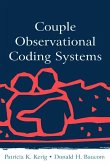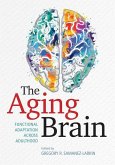The Elderly Eyewitness in Court
Herausgeber: Toglia, Michael P; Pozzulo, Joanna; Ross, David F
The Elderly Eyewitness in Court
Herausgeber: Toglia, Michael P; Pozzulo, Joanna; Ross, David F
- Gebundenes Buch
- Merkliste
- Auf die Merkliste
- Bewerten Bewerten
- Teilen
- Produkt teilen
- Produkterinnerung
- Produkterinnerung
This volume provides an overview of current empirical research on the cognitive, social, and health related factors that impact the accuracy of eyewitness testimony given by the elderly. Its audience spans researchers in cognitive and developmental psychology, and professionals working in the growing area of psychology and law.
Andere Kunden interessierten sich auch für
![Harassment, stalking, victim personal statements, child sexual abuse and eyewitness testimony. Psychological commentary applied to real magistrate and Crown Court cases Harassment, stalking, victim personal statements, child sexual abuse and eyewitness testimony. Psychological commentary applied to real magistrate and Crown Court cases]() Alexander SyderHarassment, stalking, victim personal statements, child sexual abuse and eyewitness testimony. Psychological commentary applied to real magistrate and Crown Court cases15,95 €
Alexander SyderHarassment, stalking, victim personal statements, child sexual abuse and eyewitness testimony. Psychological commentary applied to real magistrate and Crown Court cases15,95 €![The Routledge International Handbook of the Psychology of Morality The Routledge International Handbook of the Psychology of Morality]() The Routledge International Handbook of the Psychology of Morality265,99 €
The Routledge International Handbook of the Psychology of Morality265,99 €![Cases of Amnesia Cases of Amnesia]() Cases of Amnesia212,99 €
Cases of Amnesia212,99 €![Couple Observational Coding Systems Couple Observational Coding Systems]() Couple Observational Coding Systems180,99 €
Couple Observational Coding Systems180,99 €![A General Theory of Emotions and Social Life A General Theory of Emotions and Social Life]() Warren D TenhoutenA General Theory of Emotions and Social Life212,99 €
Warren D TenhoutenA General Theory of Emotions and Social Life212,99 €![Facing the Challenges of a Multi-Age Workforce Facing the Challenges of a Multi-Age Workforce]() Facing the Challenges of a Multi-Age Workforce222,99 €
Facing the Challenges of a Multi-Age Workforce222,99 €![The Aging Brain: Functional Adaptation Across Adulthood The Aging Brain: Functional Adaptation Across Adulthood]() The Aging Brain: Functional Adaptation Across Adulthood93,99 €
The Aging Brain: Functional Adaptation Across Adulthood93,99 €-
-
-
This volume provides an overview of current empirical research on the cognitive, social, and health related factors that impact the accuracy of eyewitness testimony given by the elderly. Its audience spans researchers in cognitive and developmental psychology, and professionals working in the growing area of psychology and law.
Produktdetails
- Produktdetails
- Verlag: Taylor & Francis
- Seitenzahl: 404
- Erscheinungstermin: 25. Februar 2014
- Englisch
- Abmessung: 236mm x 160mm x 46mm
- Gewicht: 1179g
- ISBN-13: 9781848726130
- ISBN-10: 1848726139
- Artikelnr.: 39615400
- Verlag: Taylor & Francis
- Seitenzahl: 404
- Erscheinungstermin: 25. Februar 2014
- Englisch
- Abmessung: 236mm x 160mm x 46mm
- Gewicht: 1179g
- ISBN-13: 9781848726130
- ISBN-10: 1848726139
- Artikelnr.: 39615400
Michael P. Toglia, PhD, is a professor and chair of psychology at the University of North Florida. From 2003 to 2011, he was executive director of the Society for Applied Research in Memory and Cognition. He has published extensively on eyewitness memory issues, has peer-reviewed nearly 500 articles and chapters, and has frequently testified in court. A former Fulbright grant recipient, he is a fellow in the Association for American Psychological Science, the Midwestern Psychological Association, and two divisions of the American Psychological Association. David F. Ross, PhD, is a UC Foundation Professor of Psychology at the University of Tennessee at Chattanooga. Dr. Ross is interested in factors that influence the accuracy of lineup identification accuracy and how jurors perceive eyewitness testimony. Dr. Ross has received funding for his research from the National Institute of Science and the Department of Justice. He has also published five edited volumes on the psychology of eyewitness testimony, has written numerous articles in top-tier journals in psychology including several law reviews, provides training to law enforcement on how to collect identification evidence, and is an instructor at the Tennessee Bureau of Investigation. Dr. Ross has also served as a trial consultant for nearly 25 years, assisting attorneys with jury selection, mock trials, witness preparation, and trial strategy. Joanna Pozzulo, PhD, is a professor in the Department of Psychology at Carleton University, Ontario, Canada. Borrowing from developmental, social, and cognitive psychology, her research focuses on the identification abilities of child eyewitnesses. Dr. Pozzulo is interested in understanding the identification processes eyewitnesses engage and the best identification procedures to be used by police in order to obtain the most accurate identification evidence. Both Dr. Pozzulo's research and teaching have received numerous awards. She has coauthored textbooks in forensic psychology for both the Canadian and American student. In addition, Dr. Pozzulo has written more than 50 peer-reviewed articles and chapters. Emily Pica, MS, is a PhD student in the Department of Psychology at Carleton University with a concentration in forensic psychology. In 2012, Ms. Pica was one of only four PhD candidates at Carleton University to be awarded the highly prestigious Trillium Scholarship. She also recieved a highly prestigious award for teaching from the Council of Canadian Departments of Psychology. Ms. Pica graduated with her MS from the University of Tennessee at Chattanooga, where she conducted research on factors that impact eyewitness memory in adults with a special emphasis on the cross-race effect in lineup identification.
Part 1: Memory for People. The Reliability of Eyewitness Identifications by the Elderly: An Evidence-based Review
S.L. Sporer
N. Martschuk. Misinformation Effect in Older versus Younger Adults: A Meta-analysis and Review
L.E. Wylie
L. Patihis
L.L. McCuller
D.Davis
E.M. Brank
E. F. Loftus
B. Bornstein. True and False Recognition of Faces by Older Persons
J. Barltett. Eyewitness Identifications: The Interaction Between Witness Age and Estimator Variables
J. Beaudry
C. Bullard. Improving the Performance of Older Witnesses on Identification Procedures
R. Wilcock
R. Bull. Part 2: Memory for Events. Aging and False Memory: Fuzzy-trace Theory and the Elderly Eyewitness
C.F.A Gomes
B.R. Cohen
A. Desai
C.J. Brainerd
V.F. Reyna. Eyewitness Memory and Metamemory in Older Adults
J. Price
M. Mueller
S.Wetmore
J. Neuschatz. Associative Memory Deficits: Implications for the Elderly Eyewitness
D.J. LaVoie
K. Fogler. Accuracy of Eyewitness Memory for Events in Young and Older Adults
A. Aizpurura
M. Migueles
E. Garcia-Bajos. Memory Trust and Distrust in Elderly Eyewitnesses: To what Extent do Older Adults Doubt their Memories?
L. Henkel. Interviewing the Elderly Eyewitness
T.A. Marche
J.L. Briere
T. L. Cordwell
R. E. Holliday. Part 3: Special Topics in Elderly Eyewitness Memory. A Credible Crime Report? Communication and Perceived Credibility of Elderly Eyewitnesses
M. Allison
C.A.E. Brimacombe. Uniting Theory to Empirical Evidence: How to Understand Memory of the Elderly Witness
A.K. Thomas
L. Gordon
J.B. Bulevich. The Older Witness in Court-An International Perspective
G.Davies
N. Robertson. Testimony by the Elderly in the Eyes of the Jury: The Impact of Juror Characteristics
A.E. Pittman
M.P. Toglia
C.T. Leone
K. Mueller-Johnson.
S.L. Sporer
N. Martschuk. Misinformation Effect in Older versus Younger Adults: A Meta-analysis and Review
L.E. Wylie
L. Patihis
L.L. McCuller
D.Davis
E.M. Brank
E. F. Loftus
B. Bornstein. True and False Recognition of Faces by Older Persons
J. Barltett. Eyewitness Identifications: The Interaction Between Witness Age and Estimator Variables
J. Beaudry
C. Bullard. Improving the Performance of Older Witnesses on Identification Procedures
R. Wilcock
R. Bull. Part 2: Memory for Events. Aging and False Memory: Fuzzy-trace Theory and the Elderly Eyewitness
C.F.A Gomes
B.R. Cohen
A. Desai
C.J. Brainerd
V.F. Reyna. Eyewitness Memory and Metamemory in Older Adults
J. Price
M. Mueller
S.Wetmore
J. Neuschatz. Associative Memory Deficits: Implications for the Elderly Eyewitness
D.J. LaVoie
K. Fogler. Accuracy of Eyewitness Memory for Events in Young and Older Adults
A. Aizpurura
M. Migueles
E. Garcia-Bajos. Memory Trust and Distrust in Elderly Eyewitnesses: To what Extent do Older Adults Doubt their Memories?
L. Henkel. Interviewing the Elderly Eyewitness
T.A. Marche
J.L. Briere
T. L. Cordwell
R. E. Holliday. Part 3: Special Topics in Elderly Eyewitness Memory. A Credible Crime Report? Communication and Perceived Credibility of Elderly Eyewitnesses
M. Allison
C.A.E. Brimacombe. Uniting Theory to Empirical Evidence: How to Understand Memory of the Elderly Witness
A.K. Thomas
L. Gordon
J.B. Bulevich. The Older Witness in Court-An International Perspective
G.Davies
N. Robertson. Testimony by the Elderly in the Eyes of the Jury: The Impact of Juror Characteristics
A.E. Pittman
M.P. Toglia
C.T. Leone
K. Mueller-Johnson.
Part 1: Memory for People. The Reliability of Eyewitness Identifications by the Elderly: An Evidence-based Review
S.L. Sporer
N. Martschuk. Misinformation Effect in Older versus Younger Adults: A Meta-analysis and Review
L.E. Wylie
L. Patihis
L.L. McCuller
D.Davis
E.M. Brank
E. F. Loftus
B. Bornstein. True and False Recognition of Faces by Older Persons
J. Barltett. Eyewitness Identifications: The Interaction Between Witness Age and Estimator Variables
J. Beaudry
C. Bullard. Improving the Performance of Older Witnesses on Identification Procedures
R. Wilcock
R. Bull. Part 2: Memory for Events. Aging and False Memory: Fuzzy-trace Theory and the Elderly Eyewitness
C.F.A Gomes
B.R. Cohen
A. Desai
C.J. Brainerd
V.F. Reyna. Eyewitness Memory and Metamemory in Older Adults
J. Price
M. Mueller
S.Wetmore
J. Neuschatz. Associative Memory Deficits: Implications for the Elderly Eyewitness
D.J. LaVoie
K. Fogler. Accuracy of Eyewitness Memory for Events in Young and Older Adults
A. Aizpurura
M. Migueles
E. Garcia-Bajos. Memory Trust and Distrust in Elderly Eyewitnesses: To what Extent do Older Adults Doubt their Memories?
L. Henkel. Interviewing the Elderly Eyewitness
T.A. Marche
J.L. Briere
T. L. Cordwell
R. E. Holliday. Part 3: Special Topics in Elderly Eyewitness Memory. A Credible Crime Report? Communication and Perceived Credibility of Elderly Eyewitnesses
M. Allison
C.A.E. Brimacombe. Uniting Theory to Empirical Evidence: How to Understand Memory of the Elderly Witness
A.K. Thomas
L. Gordon
J.B. Bulevich. The Older Witness in Court-An International Perspective
G.Davies
N. Robertson. Testimony by the Elderly in the Eyes of the Jury: The Impact of Juror Characteristics
A.E. Pittman
M.P. Toglia
C.T. Leone
K. Mueller-Johnson.
S.L. Sporer
N. Martschuk. Misinformation Effect in Older versus Younger Adults: A Meta-analysis and Review
L.E. Wylie
L. Patihis
L.L. McCuller
D.Davis
E.M. Brank
E. F. Loftus
B. Bornstein. True and False Recognition of Faces by Older Persons
J. Barltett. Eyewitness Identifications: The Interaction Between Witness Age and Estimator Variables
J. Beaudry
C. Bullard. Improving the Performance of Older Witnesses on Identification Procedures
R. Wilcock
R. Bull. Part 2: Memory for Events. Aging and False Memory: Fuzzy-trace Theory and the Elderly Eyewitness
C.F.A Gomes
B.R. Cohen
A. Desai
C.J. Brainerd
V.F. Reyna. Eyewitness Memory and Metamemory in Older Adults
J. Price
M. Mueller
S.Wetmore
J. Neuschatz. Associative Memory Deficits: Implications for the Elderly Eyewitness
D.J. LaVoie
K. Fogler. Accuracy of Eyewitness Memory for Events in Young and Older Adults
A. Aizpurura
M. Migueles
E. Garcia-Bajos. Memory Trust and Distrust in Elderly Eyewitnesses: To what Extent do Older Adults Doubt their Memories?
L. Henkel. Interviewing the Elderly Eyewitness
T.A. Marche
J.L. Briere
T. L. Cordwell
R. E. Holliday. Part 3: Special Topics in Elderly Eyewitness Memory. A Credible Crime Report? Communication and Perceived Credibility of Elderly Eyewitnesses
M. Allison
C.A.E. Brimacombe. Uniting Theory to Empirical Evidence: How to Understand Memory of the Elderly Witness
A.K. Thomas
L. Gordon
J.B. Bulevich. The Older Witness in Court-An International Perspective
G.Davies
N. Robertson. Testimony by the Elderly in the Eyes of the Jury: The Impact of Juror Characteristics
A.E. Pittman
M.P. Toglia
C.T. Leone
K. Mueller-Johnson.








